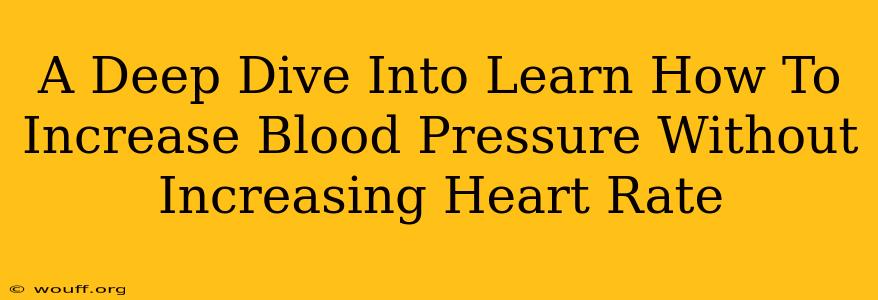Maintaining healthy blood pressure is crucial for overall well-being. However, some individuals find themselves needing to increase their blood pressure without simultaneously increasing their heart rate. This is a complex issue, and it's essential to understand the underlying causes and potential solutions. This article delves into the intricacies of this challenge, exploring safe and effective strategies. Disclaimer: This information is for educational purposes only and does not constitute medical advice. Always consult your doctor before making any changes to your health regimen.
Understanding the Relationship Between Blood Pressure and Heart Rate
Before exploring methods to increase blood pressure without affecting heart rate, let's understand the physiological relationship between the two. Blood pressure is the force of blood against your artery walls, while heart rate is the number of times your heart beats per minute. While they are interconnected, they are not directly proportional. Several factors influence blood pressure, including:
- Cardiac Output: The amount of blood your heart pumps per minute.
- Total Peripheral Resistance: The resistance to blood flow in your blood vessels.
- Blood Volume: The total amount of blood in your circulatory system.
Increasing heart rate generally increases cardiac output, leading to higher blood pressure. However, it's possible to manipulate other factors to raise blood pressure independently of heart rate.
Safe and Effective Strategies to Increase Blood Pressure
It's crucial to emphasize that attempting to increase blood pressure without medical supervision can be dangerous. If you have low blood pressure (hypotension), it's vital to consult your doctor to determine the underlying cause and develop a safe treatment plan. However, here are some strategies that may be considered under strict medical guidance:
1. Dietary Adjustments:
- Increase Salt Intake (with Caution): Sodium plays a crucial role in fluid balance and blood pressure. However, excessive sodium can be detrimental to health. Small, controlled increases under medical supervision might be considered.
- Hydration: Maintaining proper hydration is crucial. Dehydration can significantly lower blood pressure.
- Consume More Fluids: Adequate fluid intake is essential for maintaining blood volume.
- Foods Rich in Sodium: Incorporating foods naturally higher in sodium, like celery and beets, might help, but this should be done carefully and with your doctor's approval.
2. Lifestyle Modifications:
- Reduce Stress: Chronic stress can lower blood pressure. Relaxation techniques like yoga, meditation, and deep breathing exercises can help manage stress levels.
- Elevate Your Legs: Elevating your legs can temporarily increase blood pressure by improving venous return to the heart.
- Compression Stockings: These can help improve blood circulation and potentially increase blood pressure. However, it's vital to use them correctly.
3. Medical Interventions (Only Under Doctor's Supervision):
In cases of severe hypotension, your doctor might recommend medication. These medications work through various mechanisms, some of which may selectively impact blood pressure without significantly increasing heart rate. Never start or stop medication without your doctor's explicit guidance.
When to See a Doctor
If you experience persistent low blood pressure or symptoms such as dizziness, fainting, or shortness of breath, it's crucial to seek immediate medical attention. Low blood pressure can be a symptom of an underlying medical condition, and prompt diagnosis and treatment are essential.
Conclusion: Prioritize Medical Advice
Increasing blood pressure without increasing heart rate is a complex physiological issue. While lifestyle adjustments might help in some cases, it's crucial to consult a healthcare professional before implementing any strategies. They can assess your individual situation, identify the underlying cause of low blood pressure, and recommend safe and effective treatment options. Remember, your health is paramount, and seeking professional medical advice is always the best approach.

